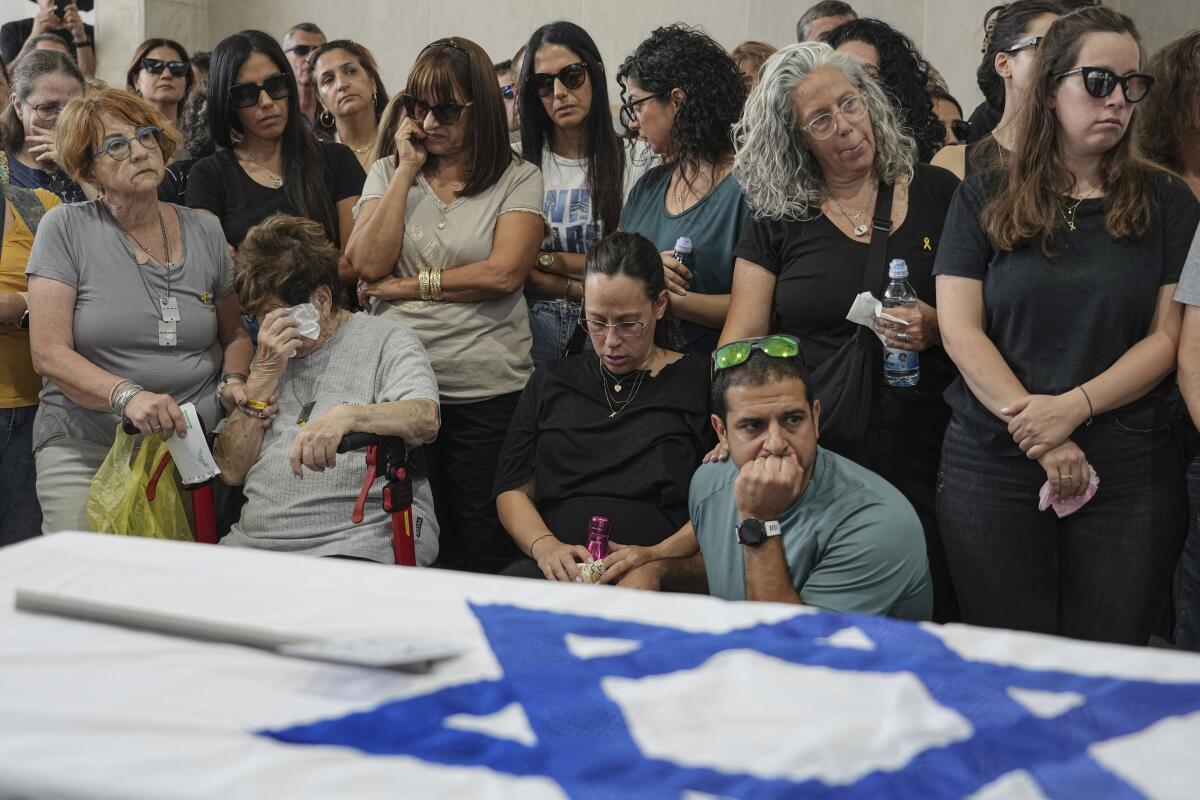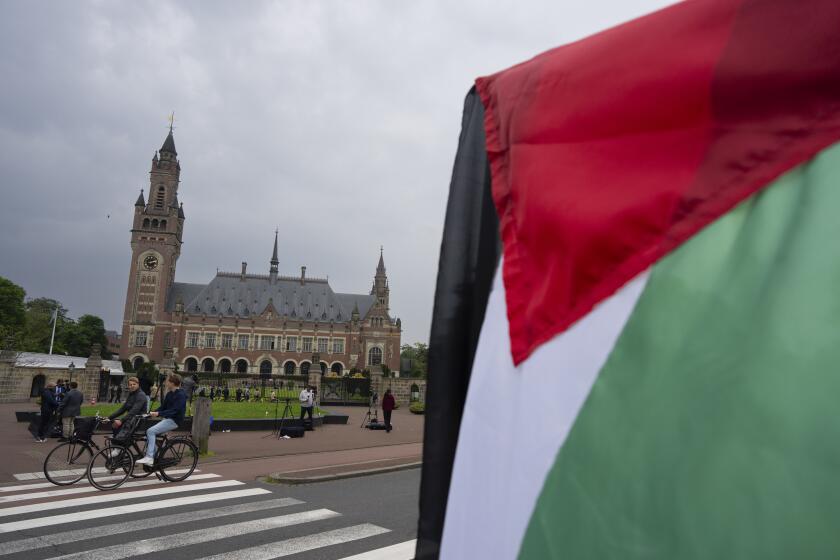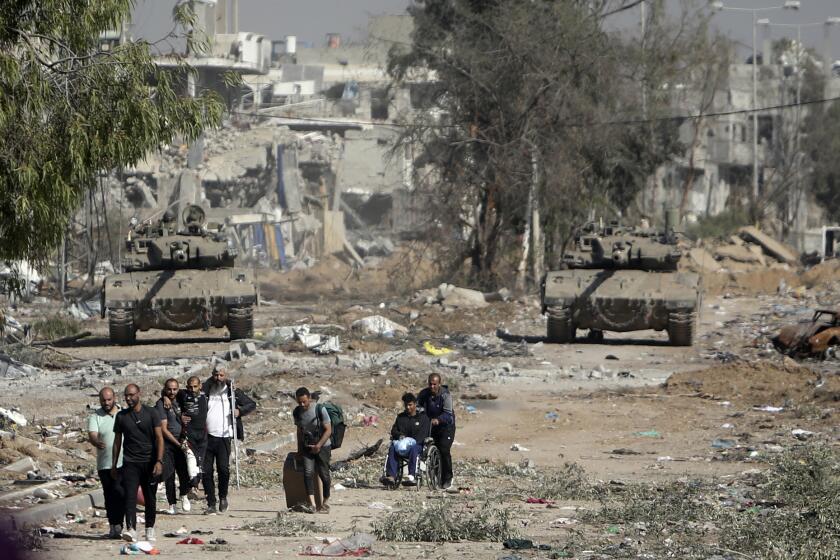Israeli airstrike kills at least 22 people in Rafah, Palestinian medics say

- Share via
DEIR AL-BALAH, Gaza Strip — Palestinian medics said an Israeli airstrike killed at least 22 people Sunday when it hit tents for displaced people in the southern Gaza city of Rafah. “Numerous” others were trapped in the debris.
The strike came two days after the International Court of Justice ordered Israel to end its military offensive in Rafah, where more than half of the Gaza Strip’s population had sought shelter before Israel’s recent incursion. Tens of thousands of people remain in the area; many have fled.
Footage from the scene showed heavy destruction and flames. There were no immediate details on the target.
The Israeli army said it was unaware of activity in the area. Defense Minister Yoav Gallant was in Rafah on Sunday and was briefed on the “deepening of operations” there, his office said.
A spokesperson with the Palestinian Red Crescent Society said the death toll was likely to rise as search and rescue efforts continued in Rafah’s Tal al-Sultan neighborhood, about 1.2 miles northwest of the city center.
Ongoing coverage of the conflict between Israel and Hamas.
The society asserted that the location had been designated by Israel as a “humanitarian area.” The neighborhood is among areas that Israel’s military this month ordered to be evacuated.
The airstrike was reported hours after Hamas fired a barrage of rockets from Gaza that set off air raid sirens as far away as Tel Aviv for the first time in months, in a show of resilience more than seven months into Israel’s massive air, sea and ground offensive.
There were no immediate reports of casualties in what appeared to be the first long-range rocket attack from Gaza since January. Hamas’ military wing claimed responsibility for the attack. Palestinian militants have sporadically fired rockets and mortar rounds at communities along the Gaza border, and the military arm of the Palestinian Islamic Jihad group later Sunday said it fired rockets at nearby communities.
The Israeli military said eight projectiles crossed into Israel after being launched from Rafah. It said “a number” of the projectiles were intercepted, and military spokesman Rear Adm. Daniel Hagari said the launcher in Rafah was destroyed.
Earlier Sunday, aid trucks entered Gaza from southern Israel under a new agreement to bypass the Rafah crossing with Egypt after Israeli forces seized the Palestinian side of it this month. But it was not immediately clear whether humanitarian groups could access the aid because of fighting.
The top United Nations court ordered Israel to halt military operations in the southern Gaza city of Rafah but did not order a full cease-fire.
Egypt refuses to reopen its side of the Rafah crossing until control of the Gaza side is handed back to Palestinians. It agreed to temporarily divert traffic through Israel’s Kerem Shalom crossing, Gaza’s main cargo terminal, after a call between President Biden and Egyptian President Abdel Fattah Sissi.
But the Kerem Shalom crossing has been largely inaccessible because of Israel’s offensive in Rafah. Israel says it has allowed hundreds of trucks to enter, but United Nations agencies say it is usually too dangerous to retrieve the aid.
“With the humanitarian operation near collapse, the secretary-general emphasizes that the Israeli authorities must facilitate the safe pickup and delivery of humanitarian supplies from Egypt entering Kerem Shalom,” the spokesperson for U.N. chief Antonio Guterres said in a statement.
The war between Israel and Hamas has killed nearly 36,000 Palestinians, according to Gaza’s Health Ministry, which does not distinguish between civilians and fighters in its count. The Health Ministry said Sunday that the bodies of 81 people killed by Israeli strikes had been brought to hospitals over the previous 24 hours.
Israel blames civilian deaths on Hamas because the militants operate in dense, residential areas.
Around 80% of Gaza’s 2.3 million people have fled their homes, severe hunger is widespread, and parts of the territory are experiencing famine, U.N. officials say.
When Israel declared war against Hamas, it stood unified at home. Now it is isolated amid global outrage over the rising death toll in the Gaza Strip.
Hamas triggered the war with its Oct. 7 attack in Israel, in which Palestinian militants killed some 1,200 people, mostly civilians, and seized some 250 hostages. Hamas still holds some 100 hostages and the remains of around 30 others, after most of the rest were released during a cease-fire last year.
Israeli Prime Minister Benjamin Netanyahu has said his country must take over Rafah to eliminate Hamas’ remaining battalions and achieve “total victory” over the militants, who recently regrouped in other parts of Gaza where the military has operated.
The war has heightened tensions in the Israeli-occupied West Bank. Palestinian authorities on Sunday said Israeli forces fatally shot a 14-year-old boy near the southern West Bank town of Saeer. The Israeli army said the Palestinian male was shot after trying to stab Israeli forces at Beit Einun Junction.
Southern Gaza has been largely cut off from aid since Israel launched what it called a limited incursion into Rafah on May 6. Since then, more than 1 million Palestinians, many of whom were already displaced, have fled the city.
Egypt’s state-run Al Qahera TV aired footage of what it said were trucks entering Gaza through Kerem Shalom. Khaled Zayed, head of the Egyptian Red Crescent in the Sinai Peninsula, which handles aid delivery from the Egyptian side of the Rafah crossing, said 200 aid trucks and four fuel trucks were scheduled to be sent to Kerem Shalom on Sunday.
Religious Zionists, most believing in a divine right to govern, now have outsize influence in Israel. The war in the Gaza Strip is energizing their settlement push.
Northern Gaza receives aid through two land routes that Israel opened during global outrage after its strikes killed seven aid workers in April.
A few dozen trucks enter Gaza daily through a U.S.-built floating pier, but its capacity remains far below the 150 trucks a day that officials hoped for. Aid groups say 600 trucks a day are needed.
Meanwhile, Israel’s military said it had detained a suspect over a widely circulated video in which a man dressed as a soldier threatens mutiny. In the video, the man says tens of thousands of soldiers were ready to disobey the defense minister over his suggestion that Palestinians should govern Gaza after the war and pledged loyalty to Netanyahu.
The military spokesman, Hagari, said the man has been removed from reserve duty. The man has not been publicly identified. It was not clear when or where the video was made. The prime minister’s office released a brief statement condemning all forms of military insubordination.
Shurafa, Goldenberg and Magdy write for the Associated Press. Goldenberg reported from Tel Aviv and Magdy from Cairo.
More to Read
Sign up for Essential California
The most important California stories and recommendations in your inbox every morning.
You may occasionally receive promotional content from the Los Angeles Times.













